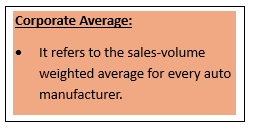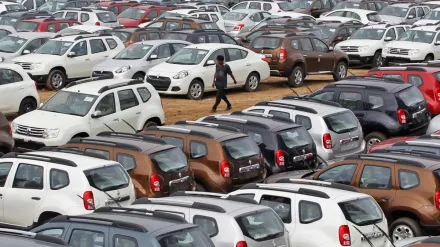Syllabus
GS-3: Science and Technology– developments and their applications and effects in everyday life; Conservation, environmental pollution and degradation, environmental impact assessment.
Context: The Bureau of Energy Efficiency (BEE) proposed CAFE-3 (Corporate Average Fuel Efficiency) norms, effective from April 2027, with CAFE-4 following.
What are CAFE norms?

- These norms refer to fuel economy standards implemented by the government to reduce fuel consumption and CO2 emissions, thereby contributing to energy conservation and environmental protection.
- The primary goal of CAFE norms is to incentivise automakers to produce and sell more fuel-efficient vehicles.
Evolution of CAFE Norms in India
- The CAFE standards were first notified in 2017 by the Union Ministry of Power (MoP) under the Energy Conservation Act, 2001.
- These apply to vehicles weighing less than 3,500 kg, including those powered by gasoline, diesel, LPG, CNG, hybrids, and electric vehicles.
- These were implemented in 2 phases, Carbon dioxide emission target of 130 grams/kilometer by 2022-23 and 113 g/km 2022-23 onwards.
CAFE-3 NORMS
- They require auto manufacturers to meet fleet-wide average carbon dioxide emission targets based on vehicle weight and sales volume.
- It targets the average fuel efficiency of the entire fleet of vehicles sold in a specific year by a producer rather than individual vehicle models.
- It follows a linear weight-based approach.
- Passenger vehicles must achieve lower CO2 emissions per kilometer, in the range of 91–95 g/km, compared to around 113 g/km under CAFE 2.
- Proposing to adopt the Worldwide Harmonized Light Vehicles Test Procedure or WLTP cycle in place of or along with the Modified Indian Driving Cycle (MIDC) to better reflect real-world driving conditions.
Concerns of CAFE-3 Norms
- Weight-Based Regulation Bias: These norms use a linear weight-based model, which results in structural bias where heavier vehicles (which generally emit more CO₂) meet the standards easily, while lighter, more efficient cars (which emit less CO₂) struggle to meet the stricter targets.
- Adverse Effect on Small Car Manufacturers: Manufacturers like Maruti Suzuki have raised concerns that current norms disincentivize the production of small cars.
- Inhibit Innovation: Discourages manufacturers from investing in lightweighting technologies, a key strategy for improving fuel economy.
- Change in production approach: Relatively lenient targets for heavier vehicles, automakers may favor producing large cars or SUVs, abandoning small car development altogether.
Need for Reforms
- Global standards: Restructuring India’s CAFE framework to better align with international practices would protect small cars from unfair regulatory burdens.
- Promoting innovation: Incentivizing innovation in lightweighting, fuel efficiency, and cleaner technologies paves the way for long-term environmental gains.
- Maintaining Affordability: Small cars are the pillar of India’s affordable vehicle market. Shielding this segment safeguards mobility for lower-income groups and sustains domestic demand.
- Encourages Decarbonization Goals: Supporting smaller, lighter, fuel-efficient vehicles aligns with India’s climate goals, decreases oil dependency, and improves urban air quality.
Source:
https://economictimes.indiatimes.com/industry/auto/auto-news/auto-emission-norms-to-get-stricter-make-cars-costlier/articleshow/110977406.cms?from=mdrhttps://www.business-standard.com/industry/auto/cafe-norms-battle-hots-up-m-m-counters-maruti-suzuki-on-relief-125071300840_1.html


